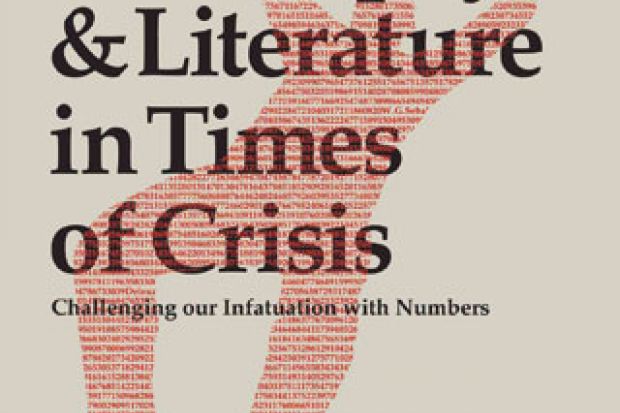Halfway through this book, I started to think that there must have been some sort of printing mix-up (or sabotage): surely this was the wrong text for the title. Philosophy and Literature in Times of Crisis could, it is true, cover practically anything. But Challenging our Infatuation with Numbers, despite the borderline self-help mode, sounded quite specific. Probably a critique of over-mathematical economics or purely statistical thinking.
When I began to read, I passed plenty of number-predicting chapter titles and subheadings: “Objects and numbers: Our current infatuation”; “What is it about numbers?”; “Certainty and the predictability of numbers”. But in the main text, not a number in sight. Finally, not long before the end, there was this: “statistical, that is to say economic-numerical”. Eureka!
I’d clung to the numbers expectation partly because it was hard to see what (if not that) the book is about. It certainly has a high count of authors discussed, from all over the Western philosophical and literary shop – including Bernard Malamud, Philip Roth, Lucretius, Sylvia Plath, Hannah Arendt, Gilles Deleuze, Walter Benjamin, W. G. Sebald; also C. P. Snow (Jean-François Lyotard strangely did not cite him, we learn). Claims of some magnitude are sometimes made: “A critical reading of Perlman’s novel is thus vital for an analysis of contemporary society”; “It will emerge from this discussion that bringing together literature, humanities and the arts with medicine, social sciences and science depends on Spinoza’s post-humanist humanism”. Past achievements are duly honoured: “As I have shown in How Literature Changes the Way We Think, literature’s truth consists in its consistent inconsistency.” And a new biology may be on the horizon when we are told that a poem “alludes to the gushing forth of blood, which also accompanies conception”.
It is said that “literature does not so much represent and consolidate past and current harmful practices but instead scoops out the mental space in which we can rethink what it means to be human and to live in our world”. Then the same sentence is said again – verbatim – near the end of the book; this was not the only (or the longest) repeated passage I noticed. Other features of presentation are equally distracting – although I can’t help liking the sound of a book by Roland Barthes called Camera Lucinda. A strange obsequiousness is implied by the information that “the ethics of literature compliments and sometimes counters that of philosophy. It compliments some strands within contemporary political thought.” Apart from the mistaken compliments, the italics here are also characteristic, with sentences highlighted at intervals throughout the book as though to rouse the reader with a random PowerPoint moment. Chronological indicators are often misleading. So Augustine or Spinoza “has” written this or that (a few years ago?), while Freud, with remarkable prescience, “sees this inescapability located in what Derrida understands by the ‘idea’ of an ‘Enlightenment to come’ ”.
I got to the end without having understood an argument. But to help people like me from losing all hope, the book thoughtfully provided the odd little comforter along the way. I’ll leave you with this one: “Literature does not only make us perceive issues we would otherwise ignore. More importantly, it has the capacity to involve our heart and soul and not solely intellectually.” What more could you ask?
Philosophy and Literature in Times of Crisis: Challenging our Infatuation with Numbers
By Michael Mack
Bloomsbury, 248pp, £65.00 and £17.99
ISBN 9781623560461 and 566494
Published 10 April 2014
Register to continue
Why register?
- Registration is free and only takes a moment
- Once registered, you can read 3 articles a month
- Sign up for our newsletter
Subscribe
Or subscribe for unlimited access to:
- Unlimited access to news, views, insights & reviews
- Digital editions
- Digital access to THE’s university and college rankings analysis
Already registered or a current subscriber? Login





